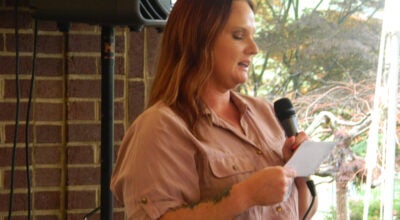Parents raise meningitis awareness
Published 12:00 am Monday, November 30, 2009
By Kathy Chaffin
kchaffin@salisburypost.com
Evan Bozof was a junior at Georgia Southwestern University in 1998 when he went to the emergency room complaining of a severe headache, nausea and vomiting.
“They told us he had a little virus, but that they’d keep him overnight because they didn’t want to send him back to the dorm,” said his mother, Lynn Bozof. “The next morning, he had a purplish rash, and they realized it wasn’t a virus.
“It was bacterial meningitis.”
Over the next 26 days, Evan was transferred to two other hospitals and had both of his arms and legs amputated. “He lost kidney function,” his mother said. “He lost liver function. He had 10 hours of grand mal seizures, and Evan was declared brain dead.”
After their son’s death, Lynn Bozof said she and her husband, Alan, who live in Marietta, Ga., found out there was a vaccine that could have saved his life. “At that point, what do you do?” she asked. “We’d already lost our child. We just didn’t want this happening to other families, so we devoted ourselves to raising awareness.
“When we sent Evan off to college,” Bozof said, “he had never received a vaccine that was recommended. To have him die and then find out about a vaccine, we thought if we didn’t know about it, then there were other parents that didn’t know about it. We just couldn’t sit back and see other families suffer the way we had.
“We felt like we owed it to Evan to raise awareness of this disease. Otherwise, he died for nothing.”
Lynn Bozof joined with four other parents ó two had also lost children and two whose children had to have both arms and legs amputated ó to start the National Meningitis Association, a nonprofit aimed at raising awareness of the symptoms of bacterial meningitis and the vaccine that can prevent it.
The disease takes two forms, she said, the most serious of which gets in the spinal column and infects the meninges (membranes) surrounding the brain. “That causes blood poisoning,” Bozof said, and can result in death within a few hours.
Sometimes the only way to get rid of the gangrene is to amputate limbs, she said, which is why some survivors end up as quadruple amputees.
The CDC (Centers for Disease Control and Prevention) now recommends that youths 11-18 be vaccinated for meningitis. The vaccine can be given to anyone between the ages of 2 through 55.
Nora Cartner, public health supervisor for the Rowan County Health Department, said parents are notified of the availability of the vaccine through the school system. The health department gives it free to children in low-income families if parents request it, she said, sometime before they enter sixth grade.
Cartner said other parents have to request the vaccine from their child’s physician. Bozof said most insurance companies cover the $60 cost of the vaccine for youths in the recommended age group.
Some states are now requiring the meningitis vaccine for entry into high school and college. Cartner said North Carolina recommends it for youths through age 18 and strongly recommends it for students going to college and “living in a dorm setting for the first time just because they’re going to be in that closeknit setting.”
As president of the National Meningitis Association encourages all parents to have their children vaccinated. “The bottom line is you’ve got a disease that’s very difficult to diagnose,” she said, ” disease that’s deadly among adolescents and young adults. One in four who get the disease will die, and another 20 percent will be left with long-term disabilities such as limb amputation, hearing loss, kidney damage and neurological problems.”
At any given time, Bozof said 20 percent of the population could be carrying the meningitis bacteria at the back of their throat. That person may not come down with the disease, she said, but could cough on someone whose resistance was low and that person could get sick.
Certain lifestyle factors such as exposure to second-hand smoke can lower someone’s resistance, she said.
Evan Bozof was studying to be a doctor, his mother said, and hoped to practice with his younger brother. Ryan Bozof is now a practicing physician. “He said he did it for both of them,” she said.
Contact Kathy Chaffin at 704-797-4249.




